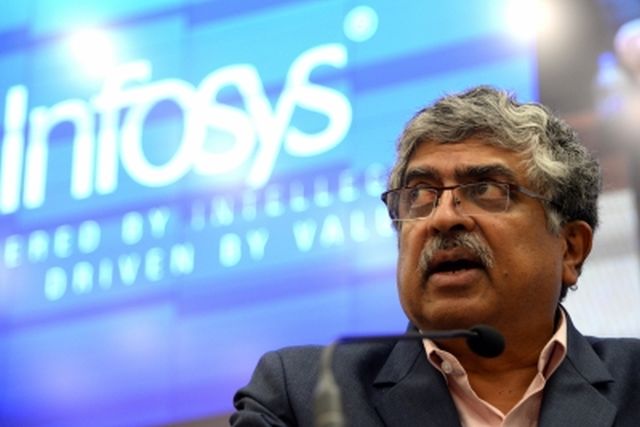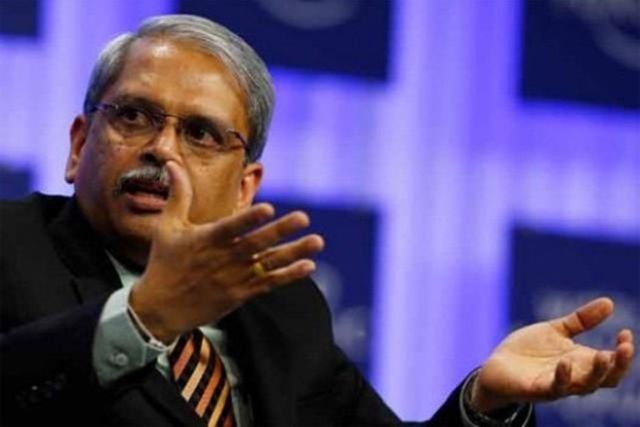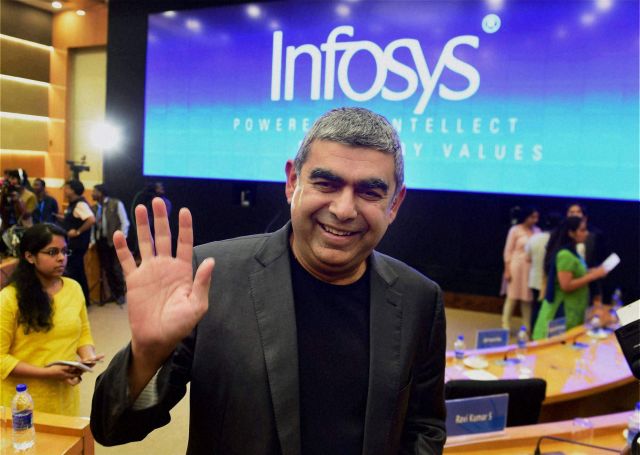
by Editor | May 25, 2021 | Business, Entrepreneurship, Investing, Large Enterprise, Startup Basics, Startup Financing

Nandan Nilekani
Bengaluru : Canadian institutional fund CDPQ on Thursday said it had invested $20 million in Indian venture Fundamentum, promoted by Infosys co-founder Nandan Nilekani and Helion founder Sanjeev Agarwal.
“La Caisse de depot et placement du Qurbec (CDPQ) joins Fundamentum board by investing $20-million (Rs 130 crore) in its first growth fund,” said the city-based seed firm in a statement here.
The unspecified equity stake will enable the Montreal-based CDPQ to explore direct investments in Fundamentum’s portfolio firms.
As a scale-up platform for mid-stage tech firms in India, Fundamentum benefits from the rich experience of Nilekani and Aggarwal along with a network of Indian entrepreneurs and key investors.
“With $100-million target, Fundamentum Partnership-Fund I will invest $15 million in start-ups in consumer and enterprise technology businesses across retail, logistics, travel and outsourcing,” it said in the statement.
Fundamentum will also combine financial and intellectual capital to scale the businesses across verticals.
The strategic investment will help CDPQ to diversify its activities in India, which is a priority market.
“We will benefit from CDPQ’s knowledge of global trends and investment expertise. Both the partners are bullish on the opportunity to build global organisations out of India over the decade and beyond,” said Nilekani.
Lauding the track record of Fundamentum management team in the tech sector, CDPQ Chief Executive Michael Sabia said by fostering investments and mentoring new firms, his team gave entrepreneurial approach aligned with its fund.
“As India ranks as the world’s third largest start-up hub, our partnership will enable the selected start-ups to scale their businesses and participate in the fast-growing parts of the country’s economy,” he said.
With $238 billion net assets, CDPQ invests globally in major financial markets, private equity, infrastructure, real estate and private debt. As a long-term investor, it manages funds primarily for public and insurance plans.
Fundamentum will lead investment rounds from $10-25 million in companies that have attained the product market fit, have an initial momentum and are looking to scale up.
—IANS

by Editor | May 25, 2021 | Corporate Jobs, Employment, Overseas
 Bengaluru : Global software major Infosys on Thursday said it will soon open a technology and innovation hub in the US state of Connecticut and hire about 1,000 American workers by 2022.
Bengaluru : Global software major Infosys on Thursday said it will soon open a technology and innovation hub in the US state of Connecticut and hire about 1,000 American workers by 2022.
“We will open our next technology and innovation hub at Harford in Connecticut and hire 1,000 American workers in the state by 2022,” said the IT major in a statement here.
The Connecticut hub will focus on insurance, healthcare and manufacturing to bring the company to the eastern state’s clients and serve as the global hub for its InsurTech and HeathTech efforts.
“Investment in Connecticut is a part of our commitment to accelerate innovation for American enterprise by amplifying local talent and shrink the IT skills gap in the marketplace,” asserted the statement.
—IANS

by Editor | May 25, 2021 | Corporate, Corporate Buzz, Entrepreneurship, Investing, Startup Basics

Infosys co-founder Kris Gopalakrishnan
Gandhinagar : Unlike in developed countries, start ups in India do not grow due to lack of enthusiasm from angel investors, Infosys co-founder Kris Gopalakrishnan said here on Saturday.
“In countries like the US, there are almost five angel investors per start up. In India, however, there is hardly one angel investor for five start ups. I am hopeful this will change.”
Also, the current turmoil in the banking system will not affect the start ups, Gopalakrishnan told the media on the sidelines of two-day Empresario StartUp Summit 2018, an annual event by the Entrepreneurship Development Institute of India.
“As far as community investing is concerned, India is good. But community investing is not in the form of equity investments, but more like debt. We need more equity investments from communities for the start ups in the country to grow.”
Gopalakrishnan said he believes India FinTech start ups are one of the best in the world, adding that the country needed a robust ecosystem for the start ups to be successful.
—IANS

by Editor | May 25, 2021 | Corporate Jobs, Employment, Opinions
 By Sanjiv Kataria,
By Sanjiv Kataria,
When Infosys founder N.R. Narayana Murthy says the trend of stagnation of starting salaries for software engineers for six to seven years is “worrisome”, we should be nervous. What does it imply for the job market? It’s only a handful of engineering graduates who get six-digit dollar offers.
As you look beyond the top 200 colleges in India, the number of placements is down dramatically over the past few years. Simply put, there are more engineering seats in Indian colleges than students, and there are more graduates than there are jobs.
The demand-supply gap is worse in engineering schools in tier 2 and tier 3 cities. Very few recruiters approach these colleges because they are remotely located, even knowing it would mean missing out on brilliant talent.
The news of a revival of economic indices — manufacturing, core sector expansion, merchandise exports — is buttressed by anecdotal references to Tata Steel and infrastructure major L&T seeing a demand surge from fast-tracked infrastructure projects. The IT sector, which once absorbed engineers like a sponge does water, expects the addition of only 200,000 new jobs in 2018, in the face of a series of protectionist moves being brought in by the US, the biggest market for the $150 billion sunrise sector.
Analysts say new job openings in digital technologies, e-commerce and Artificial Intelligence (AI) in the domestic IT sector can at best add between 50,000 to 100,000 in a country that produces a million engineering graduates each year.
Everyone is worried — students, parents, college managements, including the engineering and management education accrediting body, the All India Council for Technical Education (AICTE). In fact, AICTE has since last year mandated that all engineering colleges should let their students participate in a semester-long internship in industry.
The rapid growth of colleges in engineering and management created an excess capacity in most streams in the past. These colleges now have the flexibility to discontinue streams that don’t attract enough students and start programmes in emerging technologies while using the same infrastructure, much along the lines of broad-banding of manufacturing capacity.
The AICTE is monitoring engineering colleges that are not attracting enough students and where output quality is suspect in terms of learning outcomes. Closure of 300 such colleges is already on the cards. This move will check the oversupply of engineering seats in the country going forward.
Simultaneously, AICTE has reached out to assessment platforms like HireMee to assess engineering students to discover aptitude, logical reasoning, communication and core technical skills. This will help potential employers to access students from lesser-known, difficult-to-reach engineering colleges for suitable job openings. This project for social good can lead to a democratisation of job opportunities as it comes without any cost, either to students or the colleges.
The results of a proctored computer-assisted test by HireMee using a comprehensive assessment framework will present to recruiters different dimensions of personality and behavioural styles.
The government is equally committed to help identify the top 20 higher education institutions of eminence to achieve excellence on a global level and empower them with the wherewithal to compete with their international counterparts.
These institutions will be free to enter academic collaboration with the top 500 institutions in the world, enjoy flexibility, fix course structure, curriculum and syllabi. The scheme will enable Indian students to get world-class education and research facilities within the country.
The education policymakers are equally convinced that the curriculum has to be in tune with the market needs and, therefore, the rate of change of curriculum has to keep pace with the new technology, subjects and skills that are needed today. This is where behavioural assessment can play a big role in checking suitability for jobs.
The recent FICCI, EY and Nasscom report on “Future of Jobs in India” says that by 2022 nine per cent of India’s estimated 600 million work force will be deployed in new job roles that do not exist today. This means that once out of classrooms, the workforce has to imbibe new skills, master new technologies. Those who wish to stay ahead of the curve and stay employable will need to watch the changing technology trends and master them so that they have the first-mover advantage.
The education system, irrespective of the streams they impart education in, will have to introduce among students a new learnability trait that will instill among them a willingness to anticipate and accept change. Once out of the education system and in jobs, they will have to keep alive a strong desire to master new technologies, new skills.
These efforts at rationalising, re-building and strengthening the Indian higher education system offer no shortcuts and could take decades even after we stay focused and committed to achieving global excellence in education.
(Sanjiv Kataria has been NIIT’s brand custodian for nearly two decades. The views expressed are personal. He can be reached at Sanjiv.kataria@gmail.com )
—IANS

by Editor | May 25, 2021 | Business, Corporate, Corporate Buzz, Large Enterprise, Markets, Technology

Vishal Sikka, CEO, Infosys
By Fakir Balaji,
Bengaluru : The resilient Indian IT industry, which has been going through challenging times on multiple fronts, faced disruption in 2017 from increasing automation and the boardroom spat in software major Infosys spilling into the public domain.
Though the $150-billion (almost Rs 10 trillion) software sector reconciled to single digit export growth of 7-8 per cent for the 2017-18 fiscal, demand for more automation and using Artificial Intelligence (AI) in the services had put the vendors under pressure to hone the skills of their techies in the thousands and invest in new technologies to deliver on time for global enterprises.
“The Indian IT industry has been going through challenging times due to disruptive technologies, changing business models, rising protectionism, anti-globalisation and political and economic upheavals slowing its growth,” Nasscom President R. Chandrashekhar told IANS here.
Brexit and the sluggish demand in Europe also lowered the industry’s export growth from 9-10 per cent in the last fiscal (2016-17).
“The lower export outlook is a result of political and economic uncertainties impacting decision-making and discretionary spend,” the National Association of Software and Services Companies (Nasscom) admitted in a statement.
Software exports contribute about 80 per cent to the industry’s revenue, with the US market generating 60 per cent of this, while the domestic market is projected to grow 10-11 per cent in 2017-18.
“Modernisation of clients’ IT operations and adoption of new technologies such as SaaS (Software As A Service) applications, cloud platforms, BI (Business Intelligence), cognitive and embedded analytics for digital projects of enterprise customers have been the industry’s growth drivers in 2017,” noted Chandrashekhar.
According to Nasscom Chairman Raman Roy, the industry has reinvented and is focused on building digital solution offerings through a combination of business model changes and investment in products and platforms.
Admitting that the industry would need bold and imaginative action to resolve issues, Chandrashekhar said opportunities were unfolding, as new sectors such as healthcare, energy, transportation and manufacturing were also adopting ICT solutions to sustain, compete and grow.
Besides traditional sectors like banking, financial services and insurance (BFSI), telecom, retail, utilities, transport and logistics, a host of other verticals are investing in automation, AI, cloud computing, data analytics, machine learning, robotics and Internet of Things (IoT).
“Adoption of new technologies by traditional and new sectors like healthcare, education, gaming and entertainment, e-commerce, digital, public services and internet mobile are making the IT industry invest in skilling and reskilling their talent to sustain the momentum,” asserted Chandrashekhar.
On the flip side, innovation and tech start-ups have also faced headwinds, as angel investments and initial funding have sharply declined over the months.
“Though the ecosystem for start-ups is maturing and thriving on smart talent, raising funds to sustain growth and expand the market reach is challenging as their potential investors have become risk-averse due to uncertainty,” noted Chandrashekhar, a former Telecom Secretary and regulator.
Skill shortage in developed countries implied huge opportunities for the Indian IT industry to invest in building human capital talent and developing new platforms for digital business.
Hiring in traditional services like application development, testing and maintenance will, however, continue to decline due to automation and AI.
“The declining trend in hiring is secular and will continue due to automation, course correction and technology induced changes in the business models,” Chandrashekhar added.
Infosys, meanwhile, was rocked by boardroom battles that led to the dramatic exit of its first non-promoter Chief Executive, Vishal Sikka, in August and return of co-founder Nandan Nilekani as Chairman to steer it out of troubled times.
What began as an ethical issue for good governance the IT major is known for, had blown up into an open war between co-founder N.R. Narayana Murthy and its previous Board on the buyout of a US-based software firm (Panaya) and the severance pay to its former Chief Financial Officer, Rajiv Bhansal, in October 2015.
While Sikka tried to play down the issue, terming governance lapse as media speculation, a whistle-blower’s letter to the stock market regulator (SEBI) on the $200-million Panaya acquisition deal in February 2015 forced Murthy to red-flag the issue again with the Board members, including its former Chairman R. Seshasayee and Sikka.
When an international law firm and a risk consultancy found no evidence of wrongdoing in acquiring Panaya, Murthy insisted on making their report public and advised the Board to be transparent in all its decisions.
Unable to any more take the “unrelenting, baseless, malicious and personal attacks” on him, Sikka resigned on August 18 — for which the previous Board blamed Murthy. The open spat also brought down the company’s stock by 10 per cent in a single day.
The return of Nilekani, 62, as non-Executive Chairman on August 24 led to the exit of Seshasayee, co-chairman Ravi Venkatesan and Directors Jeffery S. Lehman and John Etchemendy.
Though Murthy was relieved to have Nilekani back to guide the company, he was not happy with the latter too finding no wrongdoing with the Panaya deal or excess compensation to Bansal.
To prove that “all is well that ends well”, the Infosys Board on December 1 hired former Capgemini veteran software geek Salil Parekh as its new Chief Executive from January 2.
(Fakir Balaji can be contacted at fakir.b@ians.in)
—IANS





